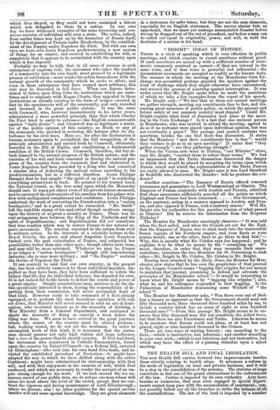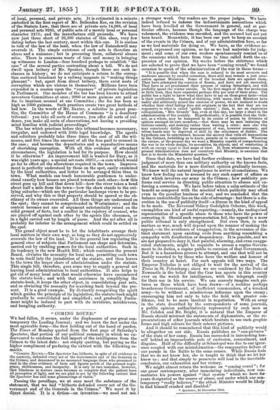THE HEALTH BILL AND LOCAL LEGISLATION. Tn - n new Health Bill
carries forward two improvements besides those strictly relating to health alone. It advances a reform in the mode of legislation on local and private business, and it will be a step in the consolidation of the statutes. The statutes at large constitute in fact one of the grand obstructions to the enforcement of the law. Justice is impeded by its own verbosity. Acts have become so numerous, that men even engaged in special depart- ments cannot keep pace with the accumulation of enactment ; can- not possibly follow out all the branches or strike the balance of all the contradictions. The law of the land is impeded by a number of local, personal, and private acts. It is estimated in a minute embodied in the first report of Mr. Bellenden Her, on the revision of the Statute Law, that there are of private acts 14,268, of local and personal acts 9285, of public acts of a merely local or personal character 2473; and the manufacture still proceeds. We have now just three short of 26,300 statutes of this class, very few dating before the last century, most within this one. It is useless to talk of the law of the land, when the law of Eatandswill may overrule it. The simple existence of such acts is therefore an abuse and a nuisance ; but in procuring them, collateral abuses arise. There is enormous waste of time and money in bringing up witnesses to London—four hundred perhaps to establish "the case" of the several parties contending about a bill. We do not dwell upon bribery of Mr. Speaker, though there are such in- stances in history ; we do not anticipate a return to the corrup- tion scattered broadcast by a railway magnate in "making things pleasant": but, apart from direct bribery, there exist nests of corruption which are vicious in themselves. Millions have been expended in a session upon the " expenses " of private legislation in Parliament. One member of the bar has been known to attend seventeen Committees at once; 2000 or more guineas are paid as fee to imprison counsel at one Committee ; the fee has been as high as 2500 guineas. Such practices create two great hotbeds of bad law. In the words of Mr. Baxter, a solicitor in great prac- tice, the Committee of the House of Commons "is a desultory tribunal: you take all sorts of courses, you offer all sorts of evi- dence, you make all sorts of observations, not having a presiding mind familiar with judicial proceedings."
The bar which practises before this tribunal becomes mercenary, irregular, and endowed with little legal knowledge. The agents and solicitors probably take three times the cost of all the wit- nesses, and five times the amount of all the fees paid to counsel in the case ; and become the depositories and a reproductive means of cherishing corruption. With all this evidence of attendant circumstance, the legislation is bad for its purpose. How should it be otherwise ? An improvement bill is wanted for Bury, as it was eight years ago ; a special act costs 3697/.,—a sum which would go far to effect all the alterations required in the town. Improve- ment is perfectly understood by those on the spot, easily examined by the local authorities, and better to be arranged there than in town. What models can teach honourable gentlemen to under- stand exactly how houses are placed towards each other—how this street goes up hill and that down hill—how the river takes a bend about half a mile from the town—how the shaw stands to the out- lying suburbs—which are the particular landscape views to be pre- served, and why this or that property should be spared or the ob- stinacy of its owner overruled. All these things are understood on the spot ; they cannot be comprehended in Westminster; and the contest becomes not one of argument substantially raised on the solid ground of facts, but a conflict in the cajolery of counsel, who are played off against each other by the agents like chessmen, or in a fight carried out by length of purse. And the act after all is probably far inferior to the arrangement which could be settled on the spot. The grand object must be to let the inhabitants arrange their local matters in their own way, so long as they do not oppressively overrule the law of the land. It is the general law regulating the general class of subjects that Parliament can shape and determine, carried out by enabling powers for the local authorities. Such in its tendency is the new Health Bill; which continues the present Board, obviates the necessity for local acts, permitting each town to vote itself into the jurisdiction of the statute, and then leaves to the town the larger share of administration under the statute. This single bill, therefore, goes some way to supply a general act leaving local administration to local authorities. It also helps to get rid of many local ads that would otherwise have encumbered the statute-book; and with that assistance in simplifying the statute-book, it keeps the other object, in consolidating past acts, and so obviating the necessity for searching back beyond the pre- sent. It is a good example. By distinctly recognizing the spirit whic.h guides the principle of its legislation, the statute-book might gradually be consolidated and simplified ; and gradually Parlia- ment might be induced to part with its invidious, mischievous, and bungling authority.



































 Previous page
Previous page